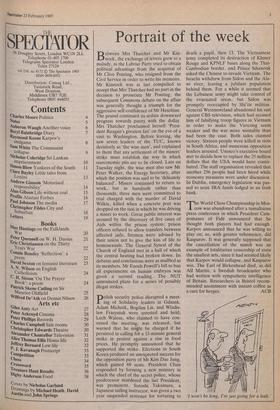Portrait of the week
etween Mrs Thatcher and Mr Kin- nock ,, the exchange of letters grew to a malady, as the Labour Party tried to obtain political advantage from the acquittal of Mr Clive Ponting, who resigned from the Civil Service in order to write his memoirs. Mr Kinnock was at last compelled to accept that Mrs Thatcher had no part in the decision to prosecute Mr Ponting; the subsequent Commons debate on the affair was generally thought a triumph for the aggressive self-confidence of Mr Heseltine. The pound continued its sedate downward progress towards parity with the dollar. Mrs Thatcher proclaimed herself 'Presi- dent Reagan's greatest ,fan' on the eve of a visit to Washington. Before leaving, she saw seven leaders of the TUC, known derisively as 'the wise men', and explained to them that any settlement of the miners' strike must establish the way in which uneconomic pits are to be closed. Late on Tuesday night, the wise men also saw Mr Peter Walker, the Energy Secretary, after which the position was said to be 'delicately balanced'. Miners continued to return to work, but in hundreds rather than thousands; three men were committed to trial charged with the murder of David Wilkie, killed when a concrete post was dropped on the taxi in which he was driving a miner to work. Great public interest was aroused by the discovery of five cases of Aids within the prison system: prison officers refused to allow transfers between affected jails; firemen were advised by their union not to give the kiss of life to homosexuals. The General Synod of the Church of England met in a hall of which the central heating had broken down. Its debates and conclusions were as muffled as its members. Mr Enoch Powell's bill to ban all experiments on human embryos was given a second reading. The NUT announced plans for a series of possibly illegal strikes.
olish security police disrupted a meet- ingg of Solidarity leaders in Gdansk. Adam Michnik, Bogdan Lis, and Wladis- law Frasyniuk were arrested and held; Lech Walesa, who claimed to have con- vened the meeting, was released, but warned that he might be charged if he persisted in calling for a 15-minute general strike in protest against a rise in food prices. He promptly announced that he supported the strike. Elections in South Korea produced an unexpected success for the opposition party of Mr Kim Dae Jung, which gained 69 seats. President Chun responded by forming a new ministry in which the chief of the secret police, whose predecessor murdered the last President, was prominent. Sutoshi Takamura, a Japanese sailing instructor, was given a two year suspended sentence for torturing to death a pupil, then 13. The Vietnamese army completed its destruction of. Khmer Rouge and KPNLF bases along the Thai- Cambodian border, and Prince Sihanouk asked the Chinese to invade Vietnam. The Israelis withdrew from Sidon and the Ala- wi river, leaving a jubilant population behind them. For a while it seemed that the Lebanese army might take control of the evacuated areas, but Sidon was promptly reoccupied by Shi'ite militias. General Westmoreland abandoned his suit against CBS television, which had accused him of falsifying troop figures in Vietnam in order to make the Vietcong seem weaker and the war more winnable than had been the case. Both sides claimed victory. Sixteen people were killed in riots in South Africa, and numerous opposition leaders arrested. Unesco's executive board met to decide how to replace the 25 million dollars that the USA would have contri- buted. The staff organisation revealed that another 256 people had been hired while economy measures were under discussion. In Dublin, emergency legislation was pas- sed to seize IRA funds lodged in an Irish bank.
he World Chess Championship in Mos- cow was abandoned after a tumultuous press conference in which President Cam- pomanes of Fide announced that he thought both players had had enough. Karpov announced that he was willing to play on; so, with greater vehemence, did Kasparov. It was generally supposed that the cancellation of the match was an example of totalitarian censorship of even the smallest arts, since it had seemed likely that Karpov would collapse, and Kasparov win. The Earl of Birkenhead died, as did Alf Martin, a Swedish broadcaster who had written with sympathetic intelligence of Britain. Researchers in Bristol recom- mended anointment with instant coffee as `I won't be long, I'm just going for a leak.'










































 Previous page
Previous page